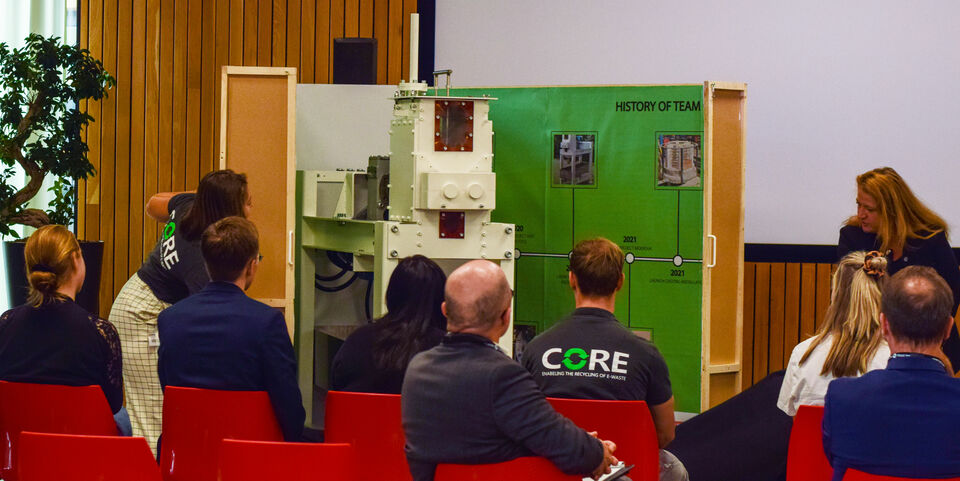Team CORE goes underwater for unique battery recycling
There are still too many risks associated with the disposal and recycling of used batteries, including the most serious risk of battery fires. Student team CORE presented its newest installation on Monday 11 October: a shredder that can shred batteries fully submerged in water, as a first step in a process towards the safe use of recycled batteries.
Under the watchful eye of the key players of recycling-Netherlands and other interested parties, a metal block disappears into the water for a technical tour de force. Team CORE came to DIFFER on the TU/e campus last Monday to present its installation, which is normally located in a building on Ekkersrijt. The prototype is a shredder that needs to become the starting point in a process towards fully recycled batteries and battery suspected materials. TU/e student team CORE, which specializes in recycling complex waste streams, unveils its newest project.
Awareness
“A new challenge,” a proud, newly appointed CORE team captain Tatum Simons says. “The number of battery fires at recycling centers has increased. The great danger posed by batteries is that they can spontaneously catch fire, for example because they became unstable as a result of damage. Electrical products with hidden batteries – think of music boxes or telephones – increase this problem, because batteries will often end up in the wrong waste stream because of this, but also because of people’s carelessness. The fact that we show people the importance of recycling is also perfectly in line with TU/e’s Zero Waste project. Creating some awareness to coincide with technological development. Because even in paper processing, batteries constitute a major cause of fire. Throwing out a battery with waste paper can be extremely dangerous. One spark caused by a warped battery in a paper stack…”
Inextinguishable
On top of that, battery fires are practically inextinguishable, specifically because the popular lithium-ion batteries can ‘start to run wild’ when they heat up. During a thermal runway, temperatures rapidly rise to extreme levels and the energy stored is suddenly released, which can cause toxic gas emissions and an explosive sea of fire. But apart from preventing dangerous fires, CORE also wants to contribute to sustainability, Simons stresses. “We want to recover scarce battery materials such as cobalt and lithium during recycling, so that these materials won’t have to be extracted at a depth of several kilometers in a mine. Enough reasons to work on a new way of battery recycling.”
Underwater
What makes this unveiled shredder unique, is that it works underwater. This makes it possible to dismantle batteries without the temperature rising. At the same time, the saline solution helps discharge the battery, Simons explains. “This is an entirely new concept, nowhere else does battery processing take place this safely. We are now using our small shredder to further develop the process. How can we protect submerged material against corrosive substances, how often do we need to shred for optimal processing? After that, we can start to scale up. Our aim is to have a functioning machine within a year that we can connect to a recycling line. Together with our important recycling partners in the Netherlands, we are working towards a sustainable future without battery fires.”
Would you like to work on innovations in the field of electronical waste recycling, and are you a student at Chemical Engineering & Chemistry? If so, Team CORE is looking for you! Contact the team here for more information.



Discussion